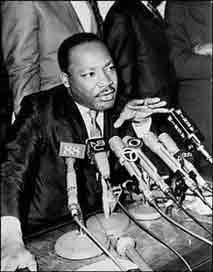Quotable
quotes
Bear defeat without losing heart
"The greatest test of courage on earth
is to bear without losing heart."
Robert Green Ingersoll (1833-1899), Americdan orator and political speechmaker.
He spoke before packed houses on topics ranging from Shakespeare to Reconstruction,
from science to religion. More over, he argued for rights of women and African-American.
"An error
doesn't become a mistake until you refuse to correct it."
Orlando Aloysius Battista
(1917-present)), Canadian chemist. He was born into a poor family. In an interview,
he proudly detailed the many professional accdomplishments of his brothers,
who include a chemist , a company president and a world-renowned neurosurgeon.
"When one door closes another door
opens; but we often look so long and so regretfully uypon the closed door
that we do not see the ones which oopen for us."
Alexander Graham Bell (1847-1922), American inventor. He was
born in Edinburgh, Scotland, but moved to the U.S., where he invented the
telephone. Bell died in Canada. At the time of his burrial, all telephone
service stopped for one minute throught the U.S. in respect for a life well
lived.
"Failure doesn't
mean you are a failure; it just means you haven't succeeded yet."
Robert H. Schuller (1926-present), American senior pastor. He is the ministries
founder of Crystal Cathedral congregation in Garden Grove, California. Now
in '70s, he is still an acitve writer and speechmaker.
![]()
4 April 1968
The murder of Martin Luther King, Jr.
 |
| Martin Luther King, Jr.. |
|
On April 4, 1968, Martin Luther King Jr., the American civil rights leader, was shot to death as he stood on the balcony outside his room at the Motel Lorraine in Memphis, Tennessee. He was in Memphis to support a sanitation workers' strike. He was pronounced dead after his arrival at a Memphis hospital. He was 39 years old. Dr. King worked against economic inequality in America and he once organized an interracial "Poor People's March" on Washington, D.C., shortly before his assassination. After the march, Dr. King traveled to Memphis in support of poorly treated African-American sanitation workers. On March 28, the march ended in violence and the death of one demonstrator. Another demonstration followed. Dr. King was killed right after his speech on April 3. Widespread riots broke out in the U.S. and troops were deployed in Memphis and Washington, D.C., for riot control. An investigation was conducted over Dr. King's murder and soon the investigation unit identified a suspect-escaped convict James Earl Ray. An extensive manhunt began and Ray was ultimately arrested in London. Ray was then extradited to the U.S. and judged before the Memphis court, where he pleaded guilty to Dr. King's murder. He was sentenced to 99 years in prison. However, he tried to withdraw his guilty plea three days later, claiming he was innocent of Dr. King's assassination and had been set up as a patsy in a larger conspiracy. His plea was denied, as were his many other requests for a re-trial during the next 29 years. During the '90s, the widow and children of Dr. King supported Ray and his claims openly, claiming his innocence and speculating about an assassination conspiracy involving the U.S. government and the military. Dr. King's widow declared that Dr. King was constantly under the supervision of the FBI for his denouncement of the Vietnam War in 1967 and for his calls for radical economic reforms. Over the years, the assassination has been reexamined by the House
Select Committee on Assassinations and looked over three times by the
U.S. Justice Department and other offices. All concluded in the end
that Ray committed the assassination because of his hatred of Dr. King.
|